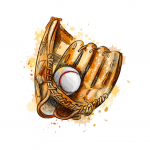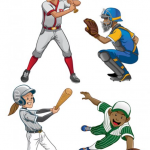Table of Contents
Responsibilities of the Catcher
What does it take to become a professional baseball player? Is it really possible to reach the Major Leagues without having played college ball or even high school ball?
Baseball has always been one of America’s favorite sports. The sport attracts millions of fans every year, and its popularity continues to increase. In fact, MLB (Major League Baseball) is now the most-watched league in the United States.
Top youth catchers gear | Catcher Sets Youth | Youth Catchers Gear 12-15 | Youth Catchers Gear For 6 to 8 Age
Baseball players spend years honing their skills before they get called up to play professionally. They start out playing at the youth level, then move up through the minor leagues until they finally reach the majors. If you want to follow in the footsteps of some of the greatest catchers ever, you’ll need to put in the time and effort required to develop your catching abilities.
In this article, we will talk about the responsibilities of the catcher. We will also look into the different levels that you can reach as a catcher and how much training is involved in each level.
Wilson Catchers Gear | Girls Softball Catchers Gear | Fastpitch Softball Catchers Gear
What Is A Baseball Catcher?
A catcher is a person who catches the baseball for his team. He is responsible for calling pitches, getting runners on base, and making sure that no balls go over the fence.
He must be able to throw the ball accurately from behind the home plate. This means he needs to have good throwing ability and accuracy. He should also be able to catch the ball with both hands.
If you want How To Become A Professional Baseball Player?
To make it to the major leagues, you need to work hard and dedicate yourself to becoming an elite athlete. You need to train like a pro and practice often so that you can improve your game.
Also, You need to know all aspects of the game. You need to learn how to call pitches, how to block balls, and how to field grounders. You need to know how to run the bases and how to hit off a tee.
catcher sets youth | Find the Exact Color of Catcher’s Gear | Nike pro gold precision catchers gear
There are many different ways to become a professional baseball catcher. Some people choose to attend college and play baseball there.
1. View of the Entire pitches
The catcher position is often considered the least glamorous on the field. However, he is responsible for making sure that his pitchers have all the information they need to succeed. He needs to be able to communicate with them effectively so that they know when to throw certain pitches and where to aim them.
A catcher must be able to read the game well enough to anticipate what the batter might do next. This means being aware of the hitter’s tendencies and knowing which pitch would best suit him. It also requires good hand-eye coordination and quick reflexes.
coach pitch catchers gear | fungo bats cheap | Baseball Bat Packs For 10-11 Year
2. Catching
Catching is the biggest responsibility of any catcher. He needs to make sure that his pitcher throws strikes and gets batters out. To achieve this goal, he needs to be able to call pitches correctly and react quickly to the situation.
He should also be able to block balls hit toward him and prevent runners from scoring. A catcher who cannot perform these tasks properly will not last long in the major leagues.
Catchers usually work closely with their pitching staff. They may help pitch coaches by scouting opposing hitters and giving feedback on their strengths and weaknesses. They may also provide advice on how to improve their own games.
Catchers are expected to be versatile and capable of performing multiple roles. For example, they may catch batting practice sessions, warm-ups, and innings pitched. They may also serve as baserunners
3. Encouraging the pitcher
A team’s success depends heavily on the performance of its starting pitcher. Therefore, it is important for the catcher to encourage his pitcher to throw strikes and keep the ball down.
If the pitcher struggles, the catcher should try to give him confidence by telling him that he is doing fine. He should also praise him if he succeeds in throwing strikes.
It is also crucial for the catcher to tell his pitcher when to change speeds or locations. This way, he can ensure that his pitcher does not waste valuable pitches.
It is essential for the catcher to communicate with his pitcher. He should let him know when he wants to see a particular pitch. He should also inform him when he thinks the batter is going to swing.
When the pitcher is ready to deliver the ball, the catcher should signal to him. The catcher should also relay instructions to his pitcher during an inning. These include whether or not to throw a curveball, slider, or fastball.
top rated slow pitch softball bat | Best Youth Baseball Bats | best baseball bat for 10 year old
4. Supporting the corner infielders on pop-ups
Catchers are often asked to support the infielders on fly balls. When a fly ball is caught, the catcher has two options: either he can run to the outfield to attempt to get the runner at first base, or he can stay put and wait for the outfielder to return to the infield.
In most cases, the catcher will choose to remain stationary. If the fielder catches the ball, he will then tag the runner before returning to the infield. If the fielder drops the ball, however, he will have to chase after it.
This is why catchers are sometimes called upon to “support” the infielders. By remaining still, the catcher makes it easier for the fielder to catch the ball. He also prevents the runner from running into the catcher while trying to score.
In addition, the catcher can use his body to shield the infielders from errant throws. He can also warn them about potential collisions.
5. Communicating with the pitching coach
A catcher’s job is to call pitches. However, he also needs to be able to communicate with the pitching coach.
For example, if the catcher notices that the pitcher is struggling to locate his pitches, he should ask the pitching coach how to help him improve.
Similarly, if the catcher sees something unusual happening with the pitcher, such as an injury, he should alert the coaching staff immediately.
best softball bat | Best Marucci Bats For Baseball | catchers mitt | Best Outfield Gloves Baseball
6. Making adjustments
Because catchers are usually the only people watching the game, they need to be aware of all aspects of the game. They should therefore pay close attention to the play at each base.
They should also keep track of the number of outs in order to determine which players are available to pinch-run.
7. Keeping score
When the catcher calls a pitch, he should record its location and type. He should also note the time when the pitch was thrown.
If the catcher misses a pitch, he should write down the information on a piece of paper. Then, he should place the paper under the plate.
Best Left-Handed Catcher’s Mitt Youth | youth size baseball gloves | Best Baseball Gloves For 7 Year Olds
8. Calling games
Finally, the catcher should call the game. He should announce the starting pitcher, inning changes, and other important events.
9. Other duties
Besides these responsibilities, the catcher may also perform various other tasks. For example, he might be required to throw batting practice to the pitchers.
He might also be expected to assist the manager by keeping score during pregame warmups.
10. The future
Catchers are generally considered to be among the least glamorous members of the team. But their skills will continue to be needed for years to come.
Conclusion
Catching is not easy. It requires great skill and concentration. And yet, it is often overlooked.
However, because it is essential to baseball, we hope you have enjoyed learning more about their responsibilities.
Easton Catcher’s Gear & Equipment | all star catchers helmet | Rawlings catchers gear | Best Mizuno Youth Catcher’s Gear Review | cheap under armour catchers gear


![Best Youth Catcher Gear For 7-9 Years Old [Overview] Best Youth Catcher Gear For 7-9 Years Old [Overview]](https://catchersports.com/wp-content/uploads/2021/04/Youth-Catchers-Gear-Clearance-150x150.jpg)


![Nike Baseball Catcher's Gear Set [Complete Guide] Nike Baseball Catcher's Gear Set [Complete Guide]](https://catchersports.com/wp-content/uploads/2021/03/nike-catchers-gear-adult-150x150.png)
![The Best Mizuno Youth Catcher's Gear Review [ The Guide 2023] The Best Mizuno Youth Catcher's Gear Review [ The Guide 2023]](https://catchersports.com/wp-content/uploads/2021/06/Mizuno-Youth-Catchers-Gear-150x150.png)